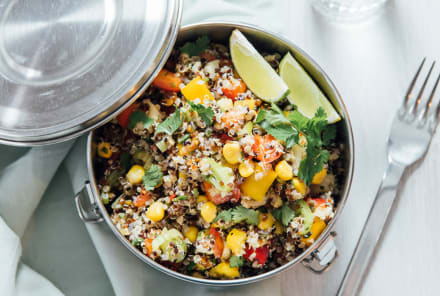Advertisement
Supplementing With This Amino Acid Could Provide Major Cardiovascular Perks*


Most people know taurine as an energy drink ingredient, but it's also one of the most abundant amino acids in the human body. Vital for energy production, taurine is currently being researched for metabolic regulation, neurological function, and overall longevity.*
A review study1 published by researchers at the Albert Einstein College of Medicine in New York put the existing research on taurine under a microscope and found that it shows particular promise for cardiovascular health.* Here's why your heart and lungs may benefit from the amino acid—and how to get it without drinking a sugar and caffeine bomb.
What did the research find?
This review study, published in the journal Nutrients, analyzed existing human and animal research on taurine. Unlike other amino acids that are used for the creation of muscle, taurine is found as a "free" amino acid2 in body tissue, where it helps out with processes like osmoregulation (water balance), calcium and potassium regulation, and bile creation. Taurine is especially prominent in the heart, where it makes up about 50% of the total free circulating amino acids.
The review notes that it has been shown to enhance cardiac contractility and improve heart function in both human and animal models. Taurine has also shown promise in enhancing vascular health and promoting healthy blood pressure.*
We need more research to determine why taurine has these effects. They seem to stem in part from taurine's antioxidant properties. The amino acid appears to protect cells from the oxidative stress and free radicals that can impact heart and lung health over time.* Taurine's cardioprotective benefits may also come from the role it plays in calcium and potassium channels, which influence cardiac electrical activity and vascular tone, the authors note.*
How do you get taurine, and who could use more of it?
You can find taurine in foods3 such as shellfish, turkey and chicken (particularly dark meat), and dairy. It's not generally in plant foods. For this reason, integrative cardiologist Joel Kahn, M.D., previously told mindbodygreen that supplementing with taurine may be helpful for vegans and vegetarians looking to support their cardiac health.*
The average adult typically gets around 40 to 400 milligrams1 of taurine per day from their diet. It's unclear from existing research how much taurine is necessary for optimal cardiovascular health.
However, we do have an idea of the amount needed for some of taurine's other benefits. One study on using taurine in sports and exercise, for example, found that consuming 1-3 grams a day for 6-15 days before activity may improve aerobic performance and enhance recovery following exercise.*
We also know that taurine levels in the body decrease with age4. (Once we turn 60, our bodies have about one-third of the taurine abundance as when we were 5.) Last summer, a much-discussed research study on mice4 found that supplementing with taurine could increase life expectancy by up to 25%. This was an animal study, so more research is needed, but it provides promising evidence that supplementing with additional taurine may enhance health span and longevity in humans, too, especially as we get older and lose natural stores.*
Supplementing with taurine doesn't need to require chugging an energy drink with questionable ingredients. You can also find daily taurine supplements on the market—including mindbodygreen's, which pairs the amino acid with creatine. Creatine is another compound critical for enhancing exercise performance and supporting recovery (which also declines with age).* Together, the duo offers a streamlined approach to building lean muscle mass while supporting cardiovascular health and healthy aging.* Learn more here.
The takeaway
Research suggests that the amino acid taurine offers promising perks for cardiovascular health, as well as exercise performance and overall longevity.* Taurine is found in certain animal foods like shellfish, turkey, and dairy products. Though the body naturally produces taurine, we lose some with age. Those who are over 60 or eat a predominantly plant-based diet, in particular, may benefit from supplementing with taurine.*

You Should Focus On Bone Health Earlier Than You Might Think — Here's Why
Dr. Vonda Wright, MD, MS

You Should Focus On Bone Health Earlier Than You Might Think — Here's Why
Dr. Vonda Wright, MD, MS

You Should Focus On Bone Health Earlier Than You Might Think — Here's Why
Dr. Vonda Wright, MD, MS

You Should Focus On Bone Health Earlier Than You Might Think — Here's Why
Dr. Vonda Wright, MD, MS

















